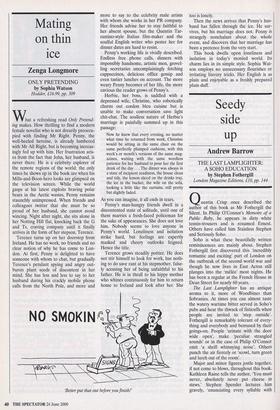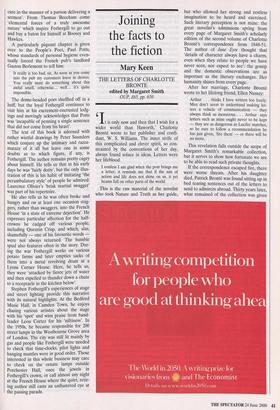Seedy side up
Andrew Barrow
THE LAST LAMPLIGHTER: A SOHO EDUCATION by Stephen Fothergill London Magazine Editions, £10, pp. 144 Quentin Crisp once described the author of this book as Mr Fothergill the Silent. In Philip O'Connor's Memoirs of a Public Baby, he appears in dirty white tennis-trousers and is renamed Ernest. Others have called him Stainless Stephen and Seriously Soho.
Soho is what these beautifully written reminiscences are mainly about. Stephen Fothergill first discovered this `incredibly romantic and exciting' part of London on the outbreak of the second world war and though he now lives in East Acton still plunges into the 'mêlée' most nights. He has been a regular at the French House in Dean Street for nearly 60 years.
The Last Lamplighter has an antique aroma to it, more of Woodbines than Sobranies. At times you can almost taste the watery wartime bitter served in Soho's pubs and hear the thwack of fisticuffs when people are invited to 'step outside'. Fothergill is remarkably tolerant of every- thing and everybody and bemused by their goings-on. People 'urinate with the door wide open', make 'peculiar strangled sounds' or in the case of Philip O'Connor emit 'a shrill whinnying noise'. Others punch the air fiercely or 'scowl, turn green and lurch out of the room'.
Major and minor figures jostle together, if not come to blows, throughout this book. Kathleen Raine tells the author, 'You must never, absolutely never put cheese in stews.' Stephen Spender lectures him gravely, 'enunciating every syllable with It really is too bad, sir, As soon as you come into the pub my customers leave in droves. You really must do something about this awful smell, otherwise... well... it's quite impossible.
The dome-headed poet shuffled off in a huff, but the loyal Fothergill continues to visit him at his excrement-encrusted lodg- ings and movingly acknowledges that Potts was 'incapable of penning a single sentence that did not come from his heart'.
The text of this book is adorned with rather wistful drawings by Peter Saunders which conjure up the intimacy and razza- matazz of it all but leave one in some doubts as to which figure, if any, is Fothergill. The author remains pretty cagey about himself. He tells us that in his early days he was 'fairly dotty', but the only illus- tration of this is his habit of imitating 'the perambulatory style' of people he admired: Laurence Olivier's 'brisk martial swagger' was part of his repertoire. He also tells us he was often broke and hungry and on at least one occasion stag- gers, rather than swaggers, into the French House 'in a state of extreme dejection'. He expresses particular affection for the half- crowns he cadged off various people, including Quentin Crisp, and which, alas, shamefully — one of his favourite words were not always returned. The humble spud also features often in the story. Dur- ing the war Fothergill works on various potato farms and later empties sacks of them into a metal revolving drum at a Lyons Corner House. Here, he tells us, they were 'attacked by fierce jets of water and then expelled to thunder down a chute to a receptacle in the kitchen below'. Stephen Fothergill's experiences of stage and street lighting provide this narrative with its natural highlights. At the Bedford Music Hall, in Camden Town, he enjoys chasing various artistes about the stage with his 'spot' and wins praise from band- leader Leon Cortez for his 'niftiness'. In the 1950s, he became responsible for 200 street lamps in the Westbourne Grove area of London. The city was still lit mainly by gas and people like Fothergill were needed to check that time-clocks, pilot lights and hanging mantles were in good order. Those interested in this whole business may care to check on the ornate lamps outside Porchester Hall, once the jewels in Fothergill's crown, or call almost any night at the French House where the quiet, retir- ing author still casts an unflustered eye at the passing parade. care in the manner of a parson delivering a sermon'. From Thomas Beecham come `elemental forces of a truly awesome nature' which inspire Fothergill to go out and buy a baton for himself at Boosey and Hawkes.
A particularly piquant chapter is given over to the People's Poet, Paul Potts, whose standards of personal hygiene even-



































































 Previous page
Previous page